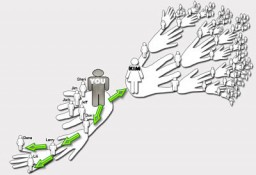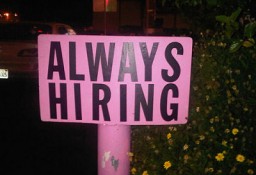I’ve heard this question many times from clients. It might be a guy who became a teacher because he didn’t know what else to do but, truthfully, he doesn’t like working with kids every day. Instead, he sees all the flaws in the system and is inclined to be a catalyst for change, making suggestions, getting others involved in projects to improve things.
But, he doesn’t dare presume to do so because he doesn’t have the qualifications or credentials to speak or act according to his natural inclinations. “Why would anyone listen to me?”
Or, it might be a woman who rose from Receptionist to VP. She has a gift for
managing others, for harnessing their strengths, talents, preferences, and
motivations of others. She is adept at determining what sort of work people
are suited for, what will encourage them, and how their talents may be used to
further corporate goals and objectives.
But everyday she goes to work thinking, “I’m not a REAL manager because I lack
an MBA or other degree, formal training, piece of paper, recognition that tells
me and others what I am, and when people find out that I have no credentials
other than what I’ve done, I will be cast out!”
In both cases, our social self is talking. Think about this for a minute. We
are swallowed up by the world and its systems and values. Society hands us
templates for acceptance. This is the development of the social self—that part
of us that wants desperately to “fit in” to society.
We are, after all, social beings who want to be liked and loved by others. We
spend our lives trying to become someone that people will like or look up to.
In doing so, we sometimes harbor feelings of inadequacy–we’re not competent
enough, sooner or later we’ll be exposed for what we are—a fraud!
This impostor syndrome is a psychological phenomenon in which individuals are
unable to own up to their strengths, or their accomplishments. It causes them
to feel like a fake, with a public face of competence that everyone sees, but
another private face of anxiety, worry, or fear. Instead of feeling like an
integrated whole, they feel fragmented, compartmentalized, or conflicted about
who they are and what they do.
Why?
Because we want to be recognized and rewarded for our authentic self. This is
our natural desire as human beings.
The word authentic is related to the notion of truthfulness—it’s about being
genuine, honest, faithful, reliable, the real thing. In philosophical terms,
it’s about living a life that is purposeful, meaningful, significant, in which
your being is aligned with your doing.
We want to experience congruence between who we are and what we do. We feel
like impostors when are feelings are grounded in what we ‘can do’ or ‘have to,’
instead of our natural strengths.
Being authentic for some, like the teacher mentioned above, is to acknowledge
that teaching is not what he really wanted in the first place. He might not
know what he wants specifically, but he knows generally that he wants more of a
fit between who he is and what he does for a living.
By focusing on those times in his life when he’s doing what he enjoys most and
doing it well, and having those stories analyzed by a story expert like myself,
he can get an accurate and reliable picture of his right work and have it
matched to the kinds of work that will recognize, reward and motivate him for
what he does naturally and effortlessly.
Each day his ideas, assumptions, beliefs about reality are being shaped by a
job experience that forces him to do something he does not want to do. He
needs to see how his strengths match up to better jobfits, ones that are
financially viable and attainable without further education. When he does, he
will have a vocabulary to communicate to others with clarity and confidence how
he can add value to an organization as a catalyst.
For the receptionist turned VP, an analysis of her stories will create a
picture of her full motivational pattern. She will see how she cannot do what
she was born to do in terms of taking overall responsibility for accomplishing
a goal or getting something done through actively directing or managing the
efforts of others.
In the past, she may have been criticized by a parent or another significant
person in life; perhaps, her natural strength was not appreciated or approved
by them; or, perhaps the expression of her natural talents was not appropriate
in certain social situations and caused problems.
Our strengths have a flip side; in some situations they are actually a weakness
or detriment to our goals, e.g. treating your siblings, friends, spouse or
children as employees who must operate or perform in the manner that you have
identified as most effective, might produce results at work but creates
friction on the home front.
By getting an accurate picture of her motivational pattern, she can leverage
her strengths in a more conscious and direct manner into her job and delegate
her non-strengths to others that complement her strengths, thereby increasing
her managerial effectiveness, instead of letting her feelings of inadequacy
drive her performance.
Do you feel like an impostor? Relax. You can integrate your being with your
doing.
The understanding you need to do so is closer than you might think, right under
your nose, in the facts, people and events of your personal story.
There is no need to suffer stress, worry, anxiety or fear about your work
identity. You are not a fraud!
The truth of who and what you are in terms of work will launch you to a new
level of success, one that will support and energize you to work with more
clarity and power.
You can be who you are and do what comes naturally for a living!










